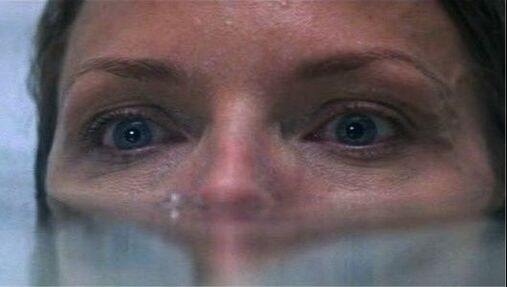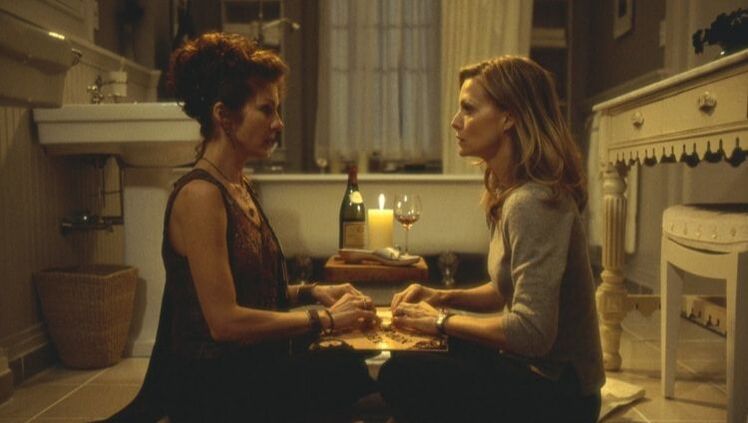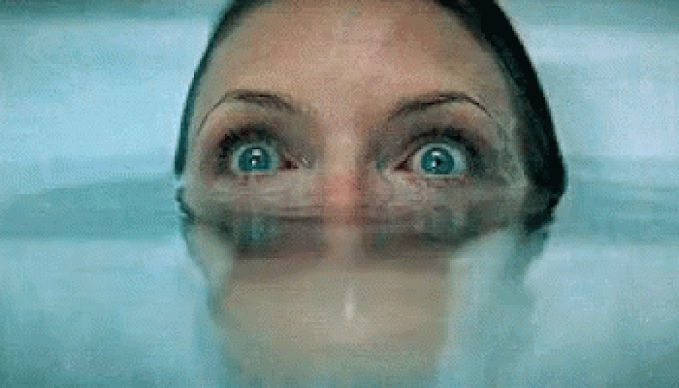20 Years Later, 'What Lies Beneath' is Still Teaching Us Why We Need to Normalize the Nosy Neighbor7/21/2020  Hooray and happy anniversary to director Robert Zemeckis’ What Lies Beneath, the ghost story Hitchcock homage that was panned by critics at the time because The Ghost Is Real, and Hitchcock does psychological, not supernatural (pout)... ...WARNING: SPOILERS AHEAD Seems pretty petty in retrospect that y’all gave negative reviews because you wanted all that ghost drama to be in Claire’s head instead of have a real-ass threat: Claire’s (Michelle Pfeiffer) manipulative and disloyal husband (Harrison Ford) murdered his mistress, who was also his student—repulsive, and her ghost seeks revenge on he and his wife. You know what, panning that narrative doesn’t just sound petty: it sounds like anti-feminist widespread cultural gaslighting. Y’all, we can’t stand for that shit 20 years later. We need to revisit What Lies Beneath because it got a lot of things right. Namely, it got right the ideas that it ain’t in your head, stop doubting yourself, and we need to normalize the nosy neighbor. Yes, at first blush, What Lies Beneath (2000) might seem like Nancy Meyers directed an episode of Scooby Doo, but the importance it places on women’s solidarity with each other is absolutely essential. In fact, there’s even a section of dialogue that directly addresses that issue. Towards the end of the film, when Claire attends a department event at the dean’s house, his wife asks Claire some sincere but somewhat invasive questions before she checks herself, saying, “I’ve become one of those nosy women I always hated.” The thing is, sure, some people are nosy for the sake of wanting to entertain themselves, if the viewer (or person) pays close enough attention, they can tell that “nosy” is the main form of security that women can offer each other: though their spouses should be the ones to take care of these women characters, they do not. The community of women takes care of each other, and that’s something that’s both fairly uncommon for film (at the time, especially) and that goes unsung in life. So, let’s talk about Claire. Yes, she might visually fit the bill of what our current culture has named a Karen (she’s white, upper-middle class, somewhat comfortable, and can with one eye slanted be seen as entitled), but she’s putting that energy to good use. Claire knows that something next door is wrong. She has seen it and heard it with her own senses. The Feurs next door are yelling at each other, and she hears crashes from the house. Later, she even sees Mary Feur (Miranda Otto) through the fence openly weeping about an interaction she had with her husband (James Remar). Claire knows she did actually see this despite what people tell her later. She trusts herself and her deductive powers to put together what she witnessed into a much bigger and horrifying puzzle. That is a quality worth admiring because even when her husband Norman tries to embarrass her at dinner with their friends about seeing the ghost of who she thinks is Mary Feur (an action which is absolutely abhorrent, and how dare you, Harrison Ford), Claire does not back off of what she knows to be true. Norman tries to gaslight her later, as well, when he takes up for the husband next door, saying “Harvey says the guy’s harmless.’ Though she stifles her reaction, the subtext that I saw written all over Claire’s face was, I don’t care what Harvey thinks. I heard what I heard, and you should trust me over your rando friend—btw who even is Harvey? Why do I give a shit about his character reference over what I actually witnessed? The most important takeaway of that interaction is that Claire knows it is not enough to observe that something is wrong. It has never been enough to simply witness that something wrong is happening. Claire also recognizes the abusive power struggle next door, certain that Mary Feur divulged feelings of fear and abandonment to her through the fence that she will later have to go back on. Claire also intuits that when Mary goes back on that statement later, that does not undo the fights that she heard, the emotional breakdown she witnessed, or the cycle of abuse that she sees escalating. Basically, Claire knows (and shows to the viewer) that it has never been enough to observe that something is wrong: she knows that she might be the only one to do anything about it, so she can’t let that shit stand. Claire furthermore recognizes that the Feur household being abusive is going to be an inconvenient fact for a lot of people to hear, so she takes it upon herself to right that wrong. So many people would not do that, even if they knew it was the right thing to do! Women have been conditioned at large to doubt ourselves and fear embarrassing ourselves or our significant others, or, worst of all, to come across rude. That, society tells us, is way worse than potentially intervening in an abusive situation. You read that right: our society has conditioned women that being impolite is worse than extricating yourself or someone else from a potentially dangerous situation. I mean think about it: if you overcome the societal self-doubt enough to speak up, you risk being branded a Karen or a Busybody, and that’s an embarrassing condescension that no one wants… so, instead, you stay quiet, and you become complicit in your own demise. Claire, however, does not subscribe to that nonsense notion. She even tells the dean’s wife, when she chastises herself for asking personal questions, No, keep going. What were you going to say? That takes some serious self-assurance that so many of us don’t have—picture this, okay: you’re at a faculty party with your decorated husband as his plus-one. You spot an acquaintance whom you’re pretty sure murdered his wife cross the hall at a University function and you scream, “You motherfucker!” in his murdery face. And then his allegedly-murdered wife shows up beside him. Your reaction is, “Oh my God, how horrifying,” right? Or is it, “Well, at least I can live with myself.” I was so proud of Claire in that moment: she trusted her intuition, and she looked out for her neighbor even if her neighbor chose to gaslight her in front of a crowd. It can be really hard to stand your ground when you have no support. When Mary Feur comes over later to clear the air, Claire even brings up that she did hear them fighting, and in that moment, Claire realizes that Mary is deluding herself. In what I thought was probably the funniest part in that movie, Claire goes along with the idea her neighbor presents, that she feels like she “might die” if her husband doesn’t come back. Claire is like, “…Sure.” She does this just to try to save the woman’s life, because getting out of a situation like that is soooo hard when you’re in it: you really need someone to stand up and be like, “This shit ain’t right. You’re not crazy.” The thing is, we as women do need that. We need each other. And you know who else holds it down? All of Claire’s friends. When her husband tries to embarrass her by telling their friends at dinner that she’s seeing ghosts, har har har, the woman friend says across the table, “Tell me more!” Jody (Diana Scarwid) shows up for the séance having almost no foreknowledge of the situation. Even Claire’s therapist (Joe Morton) supports her when she tells him that she’s seeing a ghost, and she knows it makes her sound crazy. He simply says, “Ask it what it wants.” We should note, as well, that Dr. Drayton is the only man who validates Claire’s feelings—and he should, of course, I mean, he’s her fucking therapist. But I think it’s important to note, too, that the one man who supports her feelings is Black. And he’s the only minority in the movie who isn’t just set dressing. I noticed that immediately, and while I’m not sure what exactly to make of it besides asking the question “Are we doing better at representation these two decades later?” it seems intentional that the oppressed communities hold each other down in this film. I love that there’s so much support in What Lies Beneath. And there are so many full women characters that it’s a delight. The main problem in representation is that nearly all the characters are white, and if Claire’s character was played by a minority actor, well, there would historically be even more convincing to do. However, when you have Michelle Pfeiffer in your corner, she can use that “take me to your manager” energy for good. Claire does that, of course, in rescuing Madison’s corpse from its watery grave and giving it a proper burial—but Madison does that for Claire, too. Moral of the story is: use what privilege you have to help others, we’re all in this together, and don’t fucking forget it. Or else. By Mary Kay McBrayer Enjoy Mary Kay's writing? Check out her true crime book, America's First Female Serial Killer: Jane Toppan and the Making of a Monster, available now through Amazon.
0 Comments
Leave a Reply. |
Archives
March 2023
|


 RSS Feed
RSS Feed